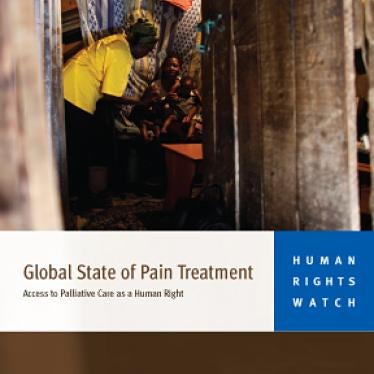A report to the U.N. General Assembly at the end of October about the need for better sex education was met with a flurry of angry voices. African nations rejected the report. Caribbean countries said they took "umbrage" and wanted to "put on record" their strong disapproval.
The report dared to say that comprehensive sex education shouldn't merely seek to scare adolescents by emphasizing deadly or disfiguring sexually transmitted infections or lecture on family planning. Instead, it suggested attention to pleasure and enjoyment of sexuality, including as an objective of sex education "abolishing guilt feelings about eroticism."
A few minutes after the report was delivered, the U.N. Special Rapporteur on Health, Anand Grover, called for countries around the world to end the so-called war on drugs. He urged countries to decriminalize drug possession and use, and offer services to drug users that can reduce HIV and hepatitis infection. Efforts to create a "drug-free" world, he said, had failed: Drug dependency is a complex problem, and drug use is deeply embedded in tradition and culture. As an example, he mentioned his father's use of "bhang lassi" - a marijuana milk shake, if you will - on religious holidays.
In the not-too-distant past, these suggestions would have caused as much outrage as the recommendation to teach kids about sex. Yet the reaction from the U.N. delegates was muted. Could it be that the collateral damage of the drug "war" and the realization of its ineffectiveness are finally creating some space to discuss alternative approaches?
There can be no doubt that current approaches to drugs are not only ineffective but also cruel. Criminalization of drug use and drug users fuels human-rights abuses and the spread of disease. In many countries, drug users are sent to "rehabilitation" centers where, without ever seeing a lawyer, judge or jury, they might spend years forced to do menial work. In some countries, drug users are experimented on, given unproven "cures" for heroin addiction. In China, more than 500 drug users were given partial lobotomies to "treat" drug use. A paper published in a scientific journal by Chinese doctors in 2003 describing the procedure led to an international outcry. Even in countries with better human-rights records, prisons are filled with nonviolent drug users, often disproportionately minorities.
Outside sub-Saharan Africa, nearly one-third of HIV cases are drug-related. In many places, as many as half of drug users are HIV-positive. Yet fewer than 5 percent of injecting drug users receive HIV-prevention services. Where drug users can access methadone and sterile needles, rates are much lower. Nonetheless, punitive approaches and preaching abstinence predominates. This focus on criminalization and law enforcement drives drug users underground, discouraging them from getting the health services they need.
Unnecessarily strict drug-control laws also have undermined the availability and accessibility of controlled medicines essential for palliative care. Access to morphine and codeine is virtually nonexistent in more than 150 countries. Tens of millions of people suffering from everything from cancer to car crashes experience untreated severe pain every year despite the fact that morphine is a cheap and effective generic drug. They are unseen casualties of the drug war.
Countries around the world are starting to recognize the failure of the current approach. Portugal's recent decision to increase drug treatment and decriminalize purchase, possession and personal use of small amounts of drugs has worked. The explosion of drug use and criminal acts predicted by critics has not emerged.
Argentina has taken similar measures. And in Mexico, where possession of small amounts of drugs for personal use has recently been decriminalized, comments by President Felipe Calderon and former President Vicente Fox regarding legalizing the production, sale and distribution of drugs have set off a wide-ranging public discussion. Many have come out in favor.
"Just say no" approaches haven't worked - for sex or drugs. Emphasizing health and education do, but this requires confronting countries that prioritize ideology over effective approaches and a respect for human rights. For both issues, millions of lives are at stake, and new approaches are desperately needed.
Joseph Amon is the director of the health and human rights division at Human Rights Watch.





